The one thing you want as a parent, is happy kids.
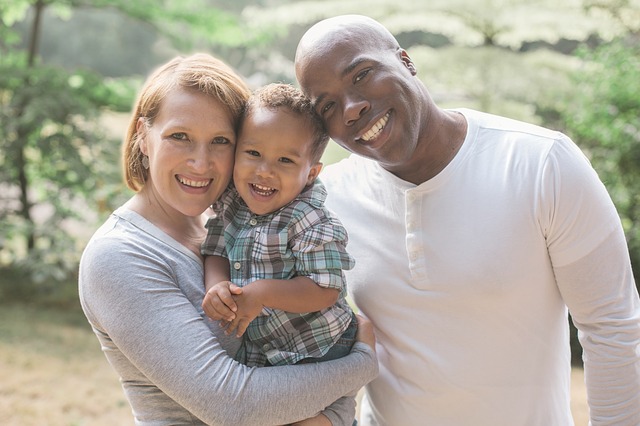
Parenting styles are essential in raising happy, independent kids, but choosing the right one can be overwhelming.
One friend swears by one parenting style, and another one tells everyone who will listen that only her parenting style produces happy, well-behaved kids. The only thing is, those parenting styles are practically opposites. And meanwhile you’re getting tired of the daily tantrums you get from your own kids.
Who is right? How can you tell? What does the research say? And will it help you get your parenting under control?
I have good news for you. Research tells us which parenting styles are most likely to harm your children and which ones will lead to happy kids (and parents!).
This comprehensive guide contains everything you need to know to clear your doubts, understand the differences between the most common parenting styles and find out what works or not according to research.
By the time you’re done, you will know what is best for you and your family and will be one step closer to having the happy family you’ve always wanted.
Let’s get started!

Table of Contents
- Is My Parenting Style Messing Up My Kids?
- The 4 Main Parenting Styles: Which One Are You?
- Other Parenting Styles You Should Know About
- So What is the Best Parenting Style?
- Your Next Step
Is My Parenting Style Messing Up My Kids?
Parents are the biggest influence on their kids. The way we relate to them determines our children’s development, emotional health, behavior and overall happiness.
Parenting styles psychology has been studies for decades, and we know that the effects of your parenting style can last a lifetime. So it’s important to get it right and have the future of your child in mind when you decide how you’re going to deal with him. Shouting may work today, but you don’t want him to have emotional issues later, right? And you don’t want to teach him that shouting is the solution either.
If you suspect that your parenting needs some work, or you’re not sure if you’re doing it right, the next section will help you identify where you are and what research has found out about the different parenting styles and their effects on children.

The 4 Main Parenting Styles: Which One Are You?
Baumrind’s Parenting Styles
Back in the 1960’s psychologist Diana Baumrind conducted a study on more than 100 preschool-age children and she identified three different parenting styles based on the level of demand and response by the parents: authoritarian, authoritative and permissive. Another parenting style -uninvolved- was later added by Maccoby and Martin, following the same criteria.
| Demanding | Undemanding | |
| Responsive | Authoritative | Permissive |
| Unresponsive | Authoritarian | Uninvolved |
Below you have a quick overview of each parenting style, followed by a more detailed description of each one.
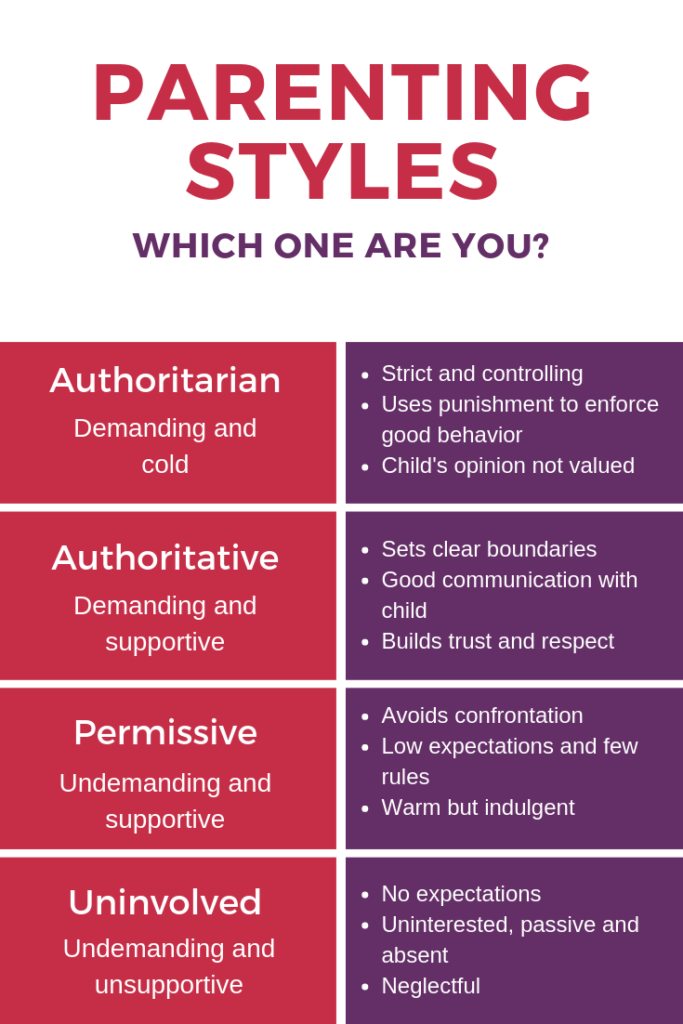
Authoritarian Parenting

Authoritarian Parenting has been the main parenting style for a long time, and still is in many countries, although things are beginning to change. Authoritarian parents are strict and controlling.
Characteristics
- You set rules and expect your child to follow them without question.
- You don’t feel the need to explain your decisions to your child.
- You have high expectations for your child and don’t tolerate mistakes.
- You don’t take your child’s feelings into consideration. You know what is good for them.
- You believe punishment is necessary to enforce the behavior you want from your child, and you’re quick to punish if something doesn’t please you.
- You are cold and unresponsive to try to control your child’s behavior.
Effects on children
- Usually obedient and proficient, but they rank lower in happiness, social competence, and self-esteem.
- Often feel hostile or aggressive to both parents and peers, and are more likely to engage in rebellious behavior.
- May become good liars to avoid punishment.
- Often feel anxiety in anticipation to conflicts with parents, due to fear.
- May experience symptoms of depression.
- More likely to act out with delinquent behavior, such as petty theft or truancy.
- Due to anger and resentment to the parents, together with high self-blame, kids are more likely to develop escapist behavior, such as substance abuse and suicidal tendencies.
Authoritative Parenting

Authoritative parents value effort and dedication, and while expectations may be high, the parents remain fair and empathetic.
Characteristics
- You communicate regularly with your children about their thoughts, feelings and ideas.
- You set clear rules and boundaries, and make sure your children understand why.
- You enforce those rules and give consequences in a fair and consistent way, taking your children’s feelings into consideration.
- You have high expectations of effort and dedication, with or without success.
- You are willing to listen to questions and to explain yourself to your children.
- You model good behavior by example and value a positive relationship with your children.
- You regularly show love and warmth to your children, and support them in their struggles.
- You believe in constructive feedback and forgiveness, rather than punishment.
Effects on children
- Children tend to be happier and more successful.
- More likely to feel comfortable sharing his feelings and opinions.
- Higher level of maturity than other children.
- More capable of independence and self-control.
- Increased competence to follow and understand rules.
- Higher ability to reason and make good decisions without adult input.
- May have better social skills and better chance of taking on leadership roles.
Permissive Parenting
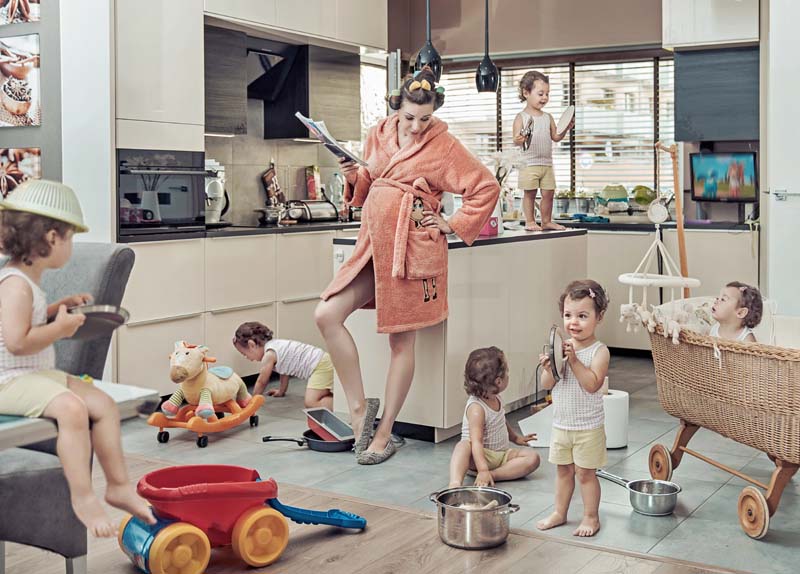
Permissive parents are very responsive but undemanding. They are also known as indulgent, and often take on the role of friend, rather than parent.
Characteristics
- You don’t set many rules, and if you do, you don’t really enforce them.
- It’s hard for you to say no to your child.
- You feel you shouldn’t interfere too much with your child.
- You don’t have many expectations for your kids in terms of maturity and self-control.
- You try to avoid confrontation with your child and let them do as they like.
- You are warm and nurturing, and show your love by giving your child free leash.
- You don’t put much effort in discouraging bad habits and behavior.
Effects on children
- May have problems with authority and adjusting to boundaries in other settings.
- Don’t require much guidance.
- Tendency to perform poorly at school.
- May be demanding and aggressive to get what they want.
- Higher risk of health problems like obesity and cavities, because parents often don’t insist on good eating habits.
- Tend to be more impulsive and as teenagers engage more often in heavy drinking and drug intake.
Uninvolved Parenting

Unresponsive and with few or no demands, uninvolved parenting is often considered neglect. It’s not always intentional, however, and may be due to parents suffering from mental illness, substance abuse or highly stressful circumstances.
Characteristics
- You have no expectations of your child and rarely communicate with him.
- You are often physically or emotionally absent.
- You don’t set boundaries and don’t respond to good or bad behavior.
- You don’t show interest in your child’s life.
- You don’t offer or seek affection from your child.
- You provide food and shelter for your child, but don’t offer guidance or support in any other way.
Effects on children
- Feelings of hostility towards parents, peers and themselves.
- Behavior problems.
- Tend to show low self-esteem, loneliness and depression.
- More likely to engage in delinquent behavior like theft, drug use, smoking and drinking.
- Low social skills due to constant feeling of rejection.
- Tend to perform poorly at school and more likely to skip class.
Comparing the 4 Parenting Styles: Examples
Sometimes it’s easier to understand the differences between parenting styles by seeing how the different parents would react to the same situation.
Situation 1: Your 5-year-old daughter has been playing in her room and the room is a mess. Now she wants to go out and play with a friend.
- Authoritarian parent: “You’re not going anywhere! You will stay home and clear this mess until I think your room looks good again. And if you’re not quick about it, you’ll suffer the consequences!”
- Authoritative parent: “I see you want to go out with your friend, but first you should tidy up your room so it’s nice and welcoming when you come back. Come, I will help you, so you can finish quicker.”
- Permissive parent: “Sure, sweety. Have fun!”
- Unresponsive parent: “Whatever”
Situation 2: Your 15-year-old son has been invited to a party at a friend’s house while his parents are away. You suspect there will be heavy drinking.
- Authoritarian parent: “No way you’re going to this party! And don’t you even dare to try to go without my permission or you’ll be grounded for a month!”
- Authoritative parent: “I don’t think it’s a good idea, and I don’t think you should go. You can go to a party when his parents are home. But how about you and I go to the movies instead?”
- Permissive parent: “Sure, you can go. Have fun, but take care, ok?”
- Unresponsive parent: “Do whatever you want.”
Are you more into video? Watch this Youtube video on parenting styles that even includes examples from famous movies.
Other Parenting Styles You Should Know About
Baumrinds’ parenting styles are a pretty broad classification, with room for many nuances. Not everybody approaches authoritative parenting the same way, and the same goes for the other parenting styles, sometimes creating a combination of two or three of them, or something completely different.

Parenting Styles that are Trending Right Now
If you are in any parent community, parenting facebook groups or follow any parenting blogs, you may have heard about these.
Positive Parenting
A very common term these days, positive parenting is basically authoritative parenting. It gets its name because it emphasizes giving positive responses to good behavior, like praise and rewards, instead of negative ones to bad behavior. No time-outs, no punishment, no shaming. Most parenting styles below are considered variations of positive parenting.
“When you’ve had one call after another and your little one is tugging on your shirt, remember what really matters. When the milk is splattered all over the floor and those little eyes are looking at you for your reaction, remember what really matters. It takes 5 minutes to clean up spilled milk; it takes much longer to clean up a broken spirit.”
Rebecca Eanes, The Newbie’s Guide to Positive Parenting
Attachment Parenting
Focuses on creating a strong and lasting bond with the child. Attachment parents are very nurturing and provide lots of proximity and emotional support with the goal of creating a strong emotional foundation for their children. They are very present while giving them space to develop their independence, and are quick at responding and adapting to their child’s needs and expressions.
Children of attachment parents have an easier time connecting with others and have fewer negative impulses, due to their calm state of mind.
Gentle Parenting
Gentle parents treat the children as equals and show them respect and unconditional love. They don’t believe in positive or negative reinforcement, and encourage good behavior by setting a good example. They value a high-quality parent-child relationship, and always try to communicate with the child in a rational way. They create a safe environment for the child to admit fault or express negative feelings, and teach them empathy and compassion towards others.
Similar to attachment parenting, children tend to be more compassionate, less hostile and more skilled at communicating with others.
Slow Parenting
These parents provide a calm and relaxed environment for their children by removing clutter, electronics and stressful schedules and activities. They don’t rush and prioritize having lots of quality time with the family to create strong emotional bonds. Children are allowed to develop their own interests and make their own decisions.

Free Range Parenting
It is based on the assumption that children are more capable than we think, and should be allowed enough freedom to develop their independence. These parents believe that children are often overprotected and need the opportunity to explore the world without so many restrictions.
Free range children get warmth, but don’t become over-reliant on parents. They suffer less from separation anxiety and are likely to develop more confidence in social and practical matters.
Tiger Parenting
Mostly associated with Eastern cultures like India, China or Japan. It is a kind of authoritarian parenting, and tiger parents have high expectations for obedience, performance and diligence. They generally lack warmth, are strict, and don’t hesitate to use punishment if it brings better results. They believe in teaching the value of hard work.
Children of tiger parents may experience higher academic success, but will often suffer from anxiety and have a negative relationship to their parents.
Gender Neutral Parenting
As a way to fight gender stereotypes, gender neutral parents avoid gender labeling at all costs. They often conceal their child’s biological gender from most people, except close family, and give their children gender neutral names. They provide toys and clothes that aren’t associated with a particular gender, thus giving the child the opportunity to develop their own identity and interests without the influence of society’s expectations and prompts.
Gender neutral children are free from stereotypes, but it can be difficult for the child, since they may get critical comments from less liberal parents with strong opinions about gender.
Parenting Styles to Avoid
Often unintentionally, parents end up adopting practices that can be harmful to their children in the short and long run. Below you will find some of the parenting styles you should avoid.

Helicopter Parenting
Helicopter parents are very overprotective of their children. Anxiety and insecurity lead them to “hover” over every aspect of the child’s life, trying to remove any obstacles or difficulties their child might encounter.
In their efforts to make they child’s life easy and painless, they often keep them away from potentially dangerous situations and go to great lengths to ensure academic success by negotiating or questioning grades, even without the consent of their child. They are often perceived as invasive by their children.
Children of helicopter parents often become resentful of the overinvolvement or may become too dependent on their parent’s help when they grow up.
If you often find yourself running after your child around the playground to prevent her from falling or hurting herself, or arranging meetings with your child’s teacher to discuss her grades, you may be a helicopter parent.
Snowplough Parenting
Snowplough parents will stop at nothing to ensure their child’s success. Like a snowplough, they remove all obstacles, and don’t hesitate to use unethical means to offer a smooth path to their child. They want to provide the best opportunities for success, and are willing to buy or force their child’s spot in a team, study program, community, etc.
While children of snowplough parents tend to have an easier access to academic, social and personal opportunities, they lack a sense of accomplishment and appreciation for them, because they never had to fight for them. They also lack a sense of fairness and are more willing to be dishonest to achieve their goals.
Narcissistic Parenting
The parent-child relationship of narcissistic parents is all about the parent. They see their child as a small version of themselves and will use him to achieve their own dreams and satisfy their own emotional and physical needs, with little regard for what the child needs or wants.
Narcissistic parenting follows the classic abusive pattern of extreme affection followed by devaluation, and the child often suffers abusive episodes when the parent feels disappointed. Narcissistic parents generally suffer from Narcissistic Personality Disorder and/or other mental illnesses.
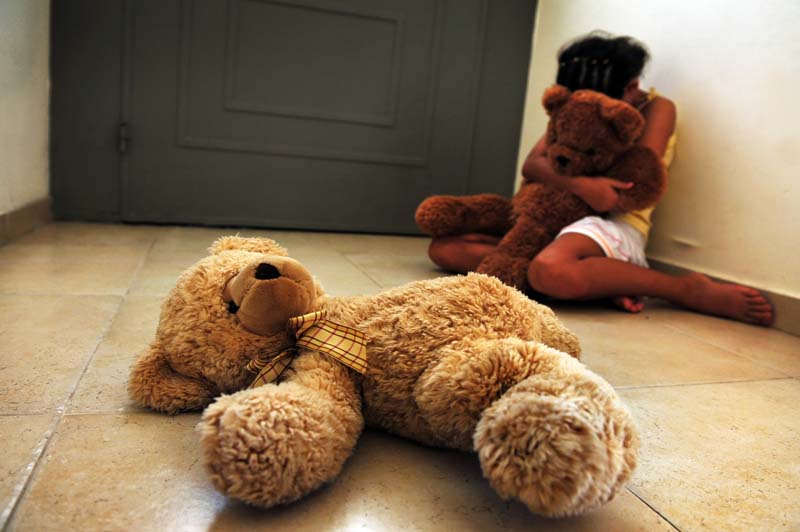
Toxic Parenting
Without a doubt the worst parenting style, toxic parenting involves all kinds of abusive behavior towards the child. These can be physical, emotional or sexual. Toxic parents actively abuse or allow the abuse to happen. They don’t provide love for their child, and generally disregard all his needs.
Children from toxic parents may suffer from low self-esteem, anxiety, depression, physical and mental trauma and suicidal tendencies, among other disorders.
Toxic parents have likely suffered from toxic parenting themselves, which makes it harder for them to identify toxic behavior. This means that children of toxic parents are more prone to be toxic parents themselves in turn.
So What is the Best Parenting Style?

As you can see, parenting styles are not black and white. By now you should have a pretty good idea of what resonates with you and what parenting styles you should avoid.
But what does the research say?
In general, among the four main parenting styles, Authoritative Parenting is considered to produce the happiest, most emotionally and socially balanced children.
If you don’t think your parenting style is quite there yet, here are a few tips for becoming a more authoritative parent.
Your next step
Parenting is hard, and getting it right is one of the biggest struggles for parents. We all want happy kids and a happy family, but things don’t always turn out the way we expected.
There are a thousand things that can affect your child’s development, and your parenting style is one of the most important ones. So let’s make sure you get that one right. It’s time to take action to ensure the best outcome for your children.
Now that you know about most parenting styles, which one sounds more like you? It doesn’t need to be a 100% match. Just the one you identify the most with.
Got it? Now it’s reflection time. Consider carefully the effects it has on children. Does any of them concern you? It may be time to switch to a different approach.
Just google the name of the parenting style that appeals to you and you will find lots of resources on how to get started, or get better at it.

But remember: parenting styles are flexible, and we are all different, our children included. Many parenting styles are variations of authoritative parenting, and you don’t need to choose a specific one, although for your child’s sake, it is recommended that you are consistent so they know what to expect of you.
As long as it is not harmful, go with what suits your personality and the lifestyle you want for your family. If you love being on the move, for example, then Slow Parenting isn’t for you.
This is all great, but sticking to a parenting style sounds hard…
We’re all human and we all lose our shit sometimes, make mistakes, feel sorry. You may be a great authoritative parent and still have a terrible day, run out of patience and shout at your kids and send them to their room to get some peace. It’s all right. What matters here is that you try your best and that most of the time you do the right thing.
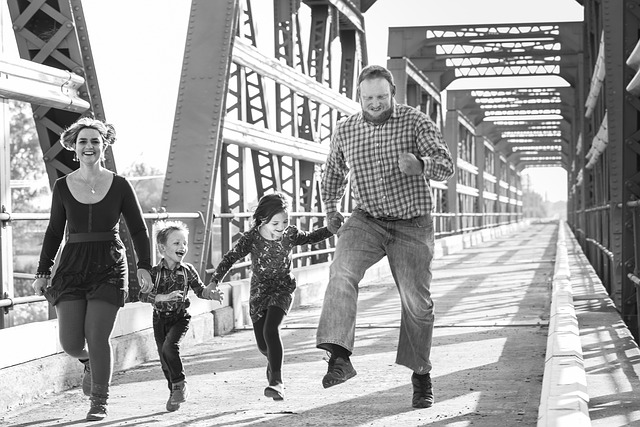
Now that you know what to search for, it will be easy to find all the resources you need to support your parenting and you will see that in no time, you will feel a lot more confident in your parenting. You have great family times ahead.
Would you like me to write something similar for you?
